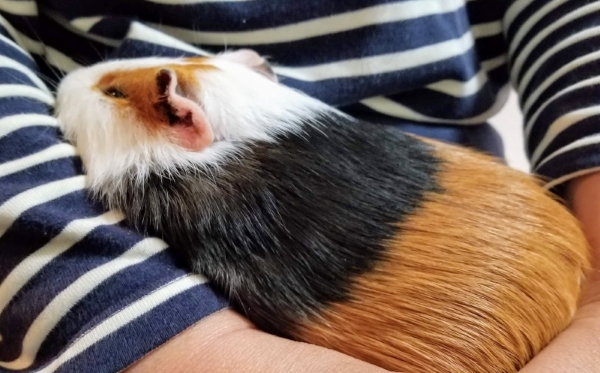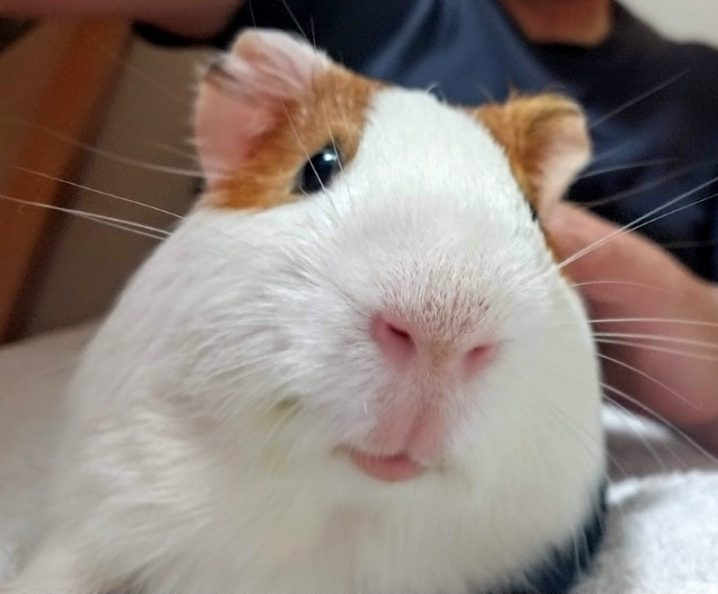Hi everyone, it’s Jacek!
モルモットの英語”guinea pig”にはなぜ”pig”豚がつくのか?の疑問
My wife and I have a guinea pig, and she once asked me about the origin of that English name, and whether the “pig” part in it was in any way related to a regular pig, which is obviously a much larger animal.
“Hmm, it’s an interesting question”, I replied, as I hadn’t really thought about that myself. After a quick search on the Internet, as kind of expected, I learned that those two biologically had nothing really in common, and the guinea pig is a rodent species.
英語名”guinea pig”の由来を調べてみた
Why would it then be called “pig”?
It still seems to be unclear, but its common name “guinea pig” or some similar term was most likely first used by European traders who brought them on ships to Europe from South America around the 16th century.
And here we all can somewhat guess why one would call these little friendly creatures “pigs”. Well, they seem to resemble their much bigger friends in some ways. For example, they have somewhat big heads relative to their bodies, bulky necks, round rumps, as well as pink ears with quite visible veins, which is easy to notice especially in my guinea pig. Not only that, the sounds they produce may seem similar to those of actual pigs’, especially their most recognized and adorable squeaking. So, we could sort of think of them as pigs that have been shrunk.
What about the “guinea” part of their name?
One could think perhaps they originally come from Guinea, but just like with the origin of the “pig” part, it’s not the case here either. One of the considered explanations would imply that they were brought to Europe via a route that included the Guinea region, and so people would eventually think they had originated there.
Another theory suggests that the term is actually derived from “Guiana”, an area in South America, which would sound somewhat logical.
Interestingly, some European languages use a name that can be directly translated as “little sea pig”, German “Meerschweinchen” and Polish “świnka morska” (direct translation from German).
日本語名モルモットの由来
And what about the Japanese easily memorized “モルモット”?
This one seems to originate from “marmot”, also a mountain-dwelling rodent, since this term was used for guinea pigs by the Dutch traders who first brought them to Japan in 1843.
Here is something funny, or maybe odd? We initially called our guinea pig “ももちゃん”, but as we got more familiar with our little family member, it somehow changed to “ぶたくん”.
Yes, literally “ぶたくん”, ideally pronounced with extra emphasis on “ぶ, almost an exclamation. Maybe not the prettiest name, but it doesn’t change the fact that we love this little creature.

Here are few terms we might have learned this time:
1. “rump”
2. “bulky”
3. “squeaking”


世界都市「東京」にあこがれてポーランドから日本にやって来た。日本文化に興味があり、英語を教えるのは日本人と交流したいから!という日本が大好きな先生。教わった英語で今度はディープな日本のことをいろいろ教えてあげてください。
※このブログでは英語学習に役立つ情報アドバイスを提供していますが、本ブログで提供された情報及びアドバイスによって起きた問題に関しては一切、当方やライターに責任や義務は発生しません。
※ここでの情報や助言を参考に英文を書いたり下した判断は、すべて読者の責任において行ってください。ここに掲載されている記事内の主張等は、個人の見解であり当社の意見を代弁・代表するものではありません。







 (10 イイネ!が押されています)
(10 イイネ!が押されています)




























コメントする